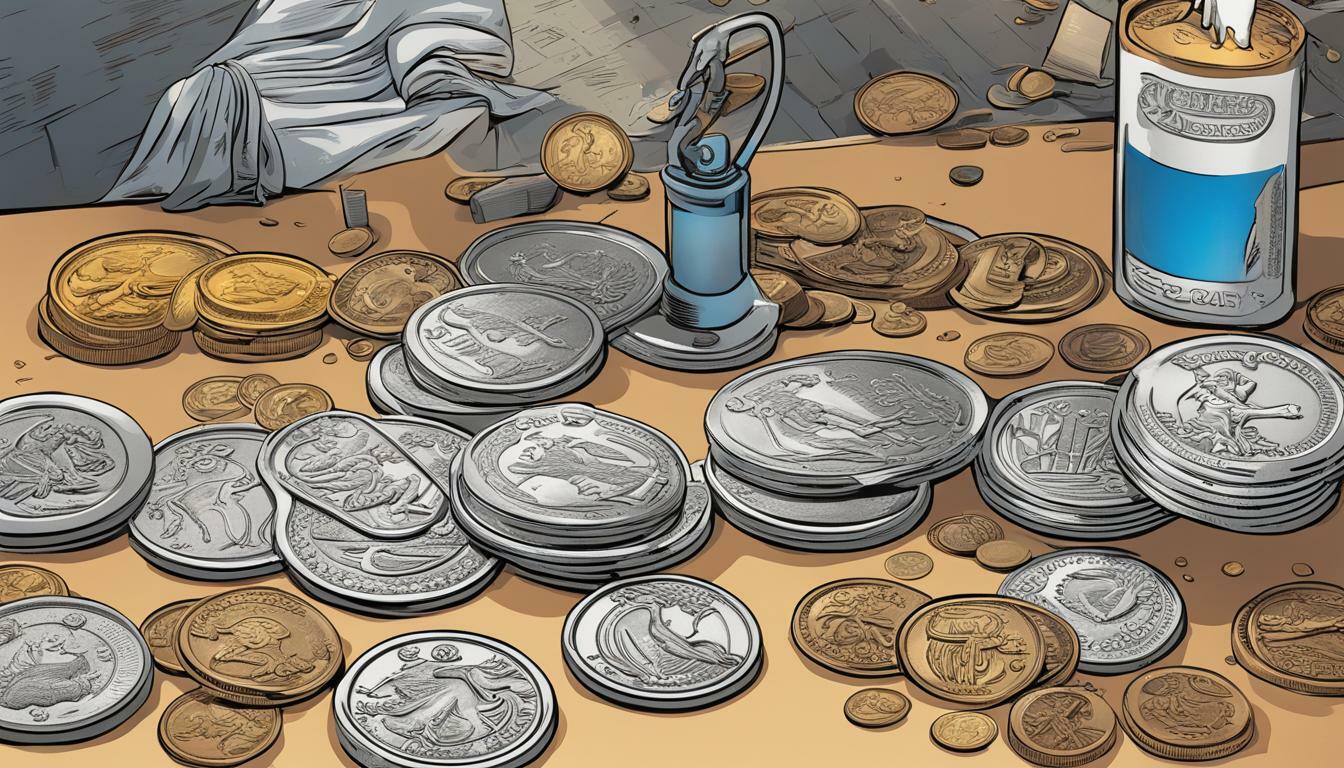
As a professional copywriting journalist and a coin collector, I understand the importance of taking care of valuable coins properly. Cleaning coins is an essential part of coin collecting, but it can also be risky if not done correctly. In this article, I will share safe coin cleaning techniques and best practices for preserving coin value during cleaning.
Key Takeaways:
- Safe coin cleaning techniques are essential to preserve the value of coins.
- Understanding the coin’s composition is crucial before choosing a cleaning method.
- Proper coin cleaning procedures, including gentle methods and handling, ensure that coins remain undamaged during the cleaning process.
- Preserving coin value during cleaning involves avoiding common mistakes, documenting the process, and seeking professional advice if necessary.
- Storing cleaned coins properly, including using acid-free holders and avoiding exposure to extreme temperatures or humidity, helps maintain their value over time.
Why Clean Coins?
As a coin collector, you may wonder why you should bother cleaning your coins. The truth is, there are several good reasons to do so.
- Restoring Appearance: Over time, coins can become dirty, tarnished, or discolored. Cleaning them can restore their appearance and make them more visually appealing.
- Preserving Value: Oftentimes, a coin’s value is determined by its condition. Keeping coins clean and well-maintained can help preserve their value and potentially even increase it.
- Removing Harmful Elements: Coins can accumulate dirt, oils, and other harmful elements that can cause damage over time. Proper cleaning can remove these substances and protect the coin from further harm.
Overall, cleaning your coins can be a simple yet effective way to maintain their appearance and value, making it a worthwhile endeavor for any collector.
Understanding Coin Composition
Before cleaning any coins, it’s important to understand their composition. Coins can be made from a variety of metals, including copper, silver, gold, nickel, and zinc. Each metal has its unique properties and requires different cleaning methods.
Copper coins, for example, are prone to oxidation and discoloration. To clean copper coins, it’s best to use a mild soap and water solution or a copper cleaning solution. Silver coins can tarnish over time, so they require a gentle cleaning method, such as soaking them in distilled water or using a silver cleaning solution. Gold coins are highly resistant to tarnishing and corrosion, but they still require proper cleaning to maintain their value and appearance.
It’s also important to note that different types of coins may have different metal compositions. For example, older U.S. pennies minted before 1982 are made of 95% copper, while newer ones are made of mostly zinc. Understanding the metal content of your coins is crucial in choosing the correct cleaning method to avoid causing damage or decreasing their value.
Safe Coin Cleaning Techniques
When it comes to cleaning coins, it’s crucial to use safe and gentle methods to avoid damaging the coins. There are several non-abrasive coin cleaning methods that are effective in removing dirt and grime while preserving the coin’s value.
One of the most common and gentle methods to clean coins is by using mild soap and water. Simply mix a small amount of mild dish soap with distilled water and use a soft-bristled brush to gently scrub the coin. Be sure not to use too much pressure or scrub too vigorously as this can cause scratches.
Another popular method is to use a coin cleaning solution specifically designed for cleaning coins. These solutions are formulated to break down dirt and grime without damaging the surface of the coin. It’s important to follow the instructions carefully and to only use the solution for a short period of time, as leaving the coin in the solution for too long can cause damage.
For those looking for a more advanced cleaning method, ultrasonic cleaners can also be used to clean coins safely. These machines use high-frequency sound waves to gently break down dirt and grime without using any harsh chemicals or abrasive materials.
No matter which method you choose, it’s important to always handle the coins with care and avoid using any abrasive materials or harsh chemicals that can cause damage. By using gentle cleaning methods, you can effectively clean your coins while preserving their value.
Proper Coin Cleaning Procedures
When it comes to cleaning coins, proper procedures are essential to avoiding damage and preserving their value. Here are some best practices for safely cleaning your coins:
- Handle coins with care. Always hold coins by the edges to avoid fingerprints or damage from handling. Never use your fingers to clean coins as the oils from your skin can cause discoloration or oxidation.
- Avoid excessive scrubbing. When cleaning a coin, use a soft-bristled brush or cloth to gently remove dirt and grime. Never use abrasive materials like sandpaper, toothbrushes or steel wool, as these can scratch the surface and lower the coin’s grade.
- Use proper cleaning solutions. Choose a coin cleaning solution that is specifically designed for the type of coin you are cleaning. Avoid harsh chemicals that can cause damage or discoloration.
- Rinse coins thoroughly. After cleaning, rinse coins thoroughly with distilled water to remove any cleaning solution residue. Avoid tap water which contains minerals that can leave spots or stains on the coin.
- Dry coins carefully. To prevent water spots or damage, use a soft, lint-free cloth to dry your coins after rinsing. Never air-dry coins as water droplets can leave marks on the surface.
Following these proper coin cleaning procedures will help you keep your coins in excellent condition and maintain their value.
Cleaning Specific Types of Coins
When it comes to cleaning coins, it’s important to consider the type of coin you’re working with as different metals require different cleaning techniques. Here are some tips for cleaning copper, silver, and gold coins:
Cleaning Copper Coins
Copper coins are known for their reddish-brown color and are prone to tarnish. Avoid using abrasive materials that can scratch the surface. Instead, use a soft-bristled brush and a mild cleaning solution to gently remove dirt and grime. You can also try using vinegar or lemon juice mixed with salt to create a natural cleaning solution.
Cleaning Silver Coins
Silver coins are highly sought after by collectors and investors alike. However, silver is also a soft metal that can easily scratch or tarnish. One gentle cleaning solution is to use a mixture of warm water and mild dish soap, gently rubbing the surface with a soft-bristled brush. For more stubborn tarnish, try using a silver cleaning solution specifically designed for coins. Avoid using baking soda, toothpaste or other abrasive materials that can damage the surface.
Cleaning Gold Coins
Gold coins are prized for their value and rarity, but they too require proper care to maintain their appearance and worth. Unlike silver and copper, gold is a relatively inert metal that does not react to most chemicals. However, it’s important to avoid harsh chemicals and abrasive materials that can scratch or damage the surface. To clean gold coins, use a soft-bristled brush and a mild soap and water solution, or try using a commercially available gold coin cleaning solution.
Tools and Materials for Coin Cleaning
When it comes to cleaning coins, using the right tools and materials is essential to avoid damaging them. Here are some of the must-have items:
- Soft-bristled toothbrushes: These are gentle enough to avoid scratching the surface of the coins.
- Lint-free cloths: These are great for gently wiping away grime and dirt without leaving behind any fibers.
- Distilled water: Using distilled water ensures that there are no impurities that could cause damage to the coins.
- Coin cleaning solutions: There are several safe and effective coin cleaning solutions available for purchase, such as MS70 or Nic-A-Date.
- Coin holders: These provide a safe place to store your coins after cleaning to prevent further damage or wear.
It’s important to note that not all tools and materials are created equal, and some may be too harsh for certain coins. Always do your research and make sure that the products you’re using are safe for the specific type of coin you’re cleaning.
Avoiding Common Mistakes
When cleaning coins, it’s essential to avoid common mistakes that could cause damage or decrease their value. Here are some pitfalls to avoid:
Using abrasive materials: Rough materials can scratch the surface of the coin, which can significantly reduce its value. Avoid using hard-bristled brushes, steel wool, or any cleaning agent that could cause abrasion.
Using harsh chemicals: Harsh chemicals like bleach, vinegar, or ammonia can corrode the metal of the coin, removing its natural patina and causing permanent damage. Only use coin cleaning solutions that are specifically designed for the metal composition of the coin.
Improper handling: Coins are delicate objects that can quickly be damaged if mishandled. Avoid touching the surface of the coin with bare hands, as the oils from your skin can cause corrosion. Instead, use cotton gloves or plastic tweezers to handle the coin.
Cleaning excessively: Over-cleaning the coin can strip away the natural patina and damage the metal. Only clean the coin if it’s necessary, and use gentle methods to preserve its appearance and value.
By avoiding these common mistakes, you can ensure that the coins are effectively cleaned without causing harm or reducing their value.
Preserving Coin Value During Cleaning
When cleaning coins, it’s crucial to preserve their value and ensure they remain in the best possible condition. Here are some tips to help you preserve the value of your coins during the cleaning process:
- Only clean coins when necessary: Over-cleaning can cause damage to your coins.
- Document the cleaning process: Take notes and/or photographs of the cleaning process to ensure consistency in the future.
- Handle coins with care: Always use clean, dry hands or gloves when handling coins to avoid leaving fingerprints or other marks.
- Avoid excessive scrubbing: Overly vigorous rubbing can cause scratches or other damage to the surface of the coin.
- Use the right tools: Only use tools specifically designed for cleaning coins, such as soft-bristled brushes and lint-free cloths.
- Seek professional advice if unsure: If you’re unsure about the best way to clean your coins, seek advice from a professional coin dealer or numismatist.
Following these tips can help you preserve the value of your coins and ensure they remain in top condition for years to come.
Storing Cleaned Coins
Once you have successfully cleaned your coins, it is important to store them properly to preserve their value and prevent damage. Here are some coin storage best practices to keep in mind:
- Invest in acid-free coin holders to prevent any chemical reactions with the metal.
- Avoid exposing your coins to extreme temperatures or humidity, which can cause discoloration or corrosion.
- Keep your coins away from chemicals or pollutants, as exposure to these substances can cause damage.
- Store your coins in a cool, dry place, such as a safe deposit box or a secure cabinet.
- Avoid touching the surface of the coin with your fingers, as the oils and acids from your skin can cause damage over time.
By following these simple guidelines for storing cleaned coins, you can ensure that your collection remains in top condition for years to come.
Conclusion
In conclusion, cleaning coins without causing harm is a delicate process that requires knowledge and patience. Choosing the right method and tools, understanding the composition of the coins, and following proper procedures are essential to avoid damaging the coins and potentially decreasing their value.
But don’t let this discourage you from cleaning your coins! There are effective ways to clean coins without harm, and the benefits of seeing their appearance restored and potentially increasing their value are well worth the effort.
Remember, preserving the value of your coins during cleaning is key. Avoid common mistakes such as using abrasive materials or harsh chemicals, document the cleaning process, and seek professional advice if needed.
And once your coins are cleaned, make sure to store them properly in acid-free coin holders, away from extreme temperatures or humidity, and free from exposure to pollutants or chemicals.
By following these tips and best practices, you can safely and effectively clean your coins without causing harm and enjoy their beauty and value for years to come.
FAQ
Q: Can I clean my coins with regular household cleaning products?
A: No, it is not recommended to clean coins with regular household cleaning products as they can be abrasive and cause damage to the coin’s surface.
Q: What is the safest method to clean coins?
A: The safest method to clean coins is to use mild soap and water, gently rubbing the surface with a soft cloth or brush.
Q: Can I use ultrasonic cleaners to clean coins?
A: Ultrasonic cleaners can be effective in cleaning coins, but caution must be exercised as prolonged exposure or using high-frequency settings can potentially damage the coins.
Q: Is it necessary to clean every coin I own?
A: It is not necessary to clean every coin you own. Only clean coins that have significant dirt or tarnish buildup, as unnecessary cleaning can potentially devalue the coin.
Q: How should I handle coins while cleaning?
A: It is recommended to handle coins by the edges to avoid transferring oils from your fingers onto the surface. Gloves can also be used to prevent direct contact.
Q: Can I clean coins made of different metals using the same method?
A: Different metals require different cleaning methods. It is important to understand the composition of the coins before choosing the appropriate cleaning method.
Q: Should I dry the coins after cleaning?
A: Yes, it is important to thoroughly dry the coins after cleaning to avoid water spots or damage. Use a soft, lint-free cloth to gently pat them dry.
Q: What tools do I need for coin cleaning?
A: Essential tools for coin cleaning include soft brushes, lint-free cloths, and coin holders for safe storage after cleaning.
Q: What are some common mistakes to avoid when cleaning coins?
A: Common mistakes to avoid include using abrasive materials, harsh chemicals, or improper handling that can cause scratches or tarnish to the coins.
Q: How can I preserve the value of my coins during the cleaning process?
A: To preserve the value of coins during cleaning, avoid excessive cleaning, document the process, and seek professional advice if unsure about the appropriate method.
Q: How should I store cleaned coins?
A: Cleaned coins should be stored in acid-free coin holders, away from extreme temperatures or humidity, and protected from exposure to chemicals or pollutants.





